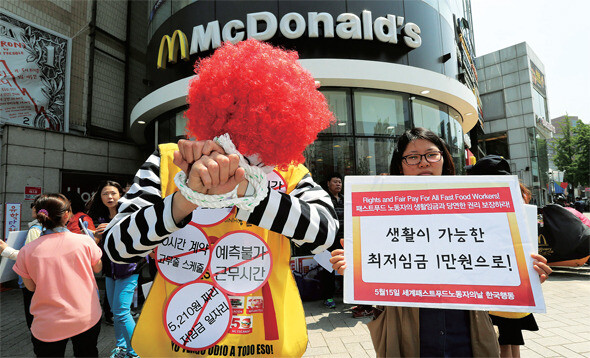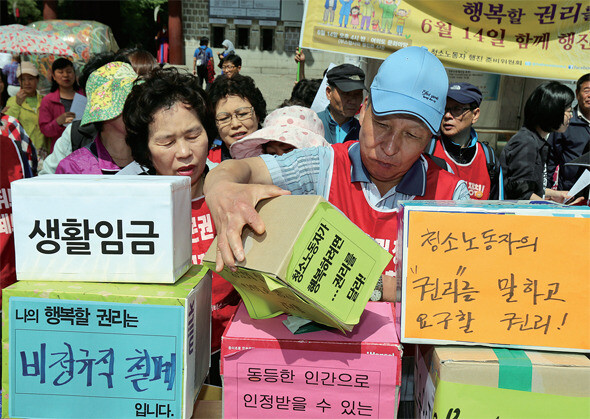hankyoreh
Links to other country sites 다른 나라 사이트 링크
Seoul city government to implement living wage system

By Eum Sung-won, staff reporter
The city of Seoul will become the first metropolitan government to fully implement a living wage for its workers. A living wage refers to the lowest wage that still affords workers a decent life. Consequently, as early as next year, people working for Seoul Metropolitan Government and affiliated organizations will receive about 26% more than the legal minimum wage.
After sparking discussion at the local governmental level in the Seongbuk and Nowon districts of Seoul, the living wage system is now spreading to metropolitan governments. The living wage could even create momentum for bringing about economic democratization and bringing up the minimum wage to a realistic level.
“In 2015, we will be fully implementing a living wage system in Seoul. The system will guarantee that workers will earn enough money from their jobs to enjoy a basic decent lifestyle (covering the costs of housing, food, transportation, and culture) and to play a role as autonomous economic agents,” the city of Seoul said on Sept. 2.
In conjunction with the Seoul Institute, the city of Seoul calculated the living wage for this year as 6,582 won (about US$6) per hour. This is 1,372 won (26.3%) higher than the legal minimum wage, which is 5,210 won this year. Seoul is planning to apply this living wage to workers who are directly employed by Seoul Metropolitan Government and the organizations in which it has equity.
The minimum wage is supposed to set a floor for wages, a line lower than which wages cannot go. But for a substantial number of workers, it has effectively functioned more as the maximum wage they can receive. Companies have not wanted to pay workers more than the government-mandated minimum wage. As of 2013, minimum wage was only 68% of the average monthly expenditure of a single-person household (1.49 million won, US$1,462).
As a result, Seoul Metropolitan Government calculated the living wage by adding together 50% of the average expenditures of a three-person household, the cost needed for the smallest residence (36㎡) available in Seoul, and 50% of the average cost of private education in Seoul.
“The fact is that the cost of private education accounts for a substantial portion of the cost of living. We wanted to calculate a living wage that is in sync with this reality,” explained Park Mun-gyu, chief of the job planning department for the city of Seoul, when asked why the cost of private education was included in the living wage.
The living wage has already been implemented in the Seongbuk and Nowon districts of Seoul, Bucheon in Gyeonggi Province, and Gyeonggi Provincial Office of Education. Recently, Gyeonggi Province has also announced that it will introduce the system starting in Jan. 2015.
“As the number of local governments introducing a living wage system increase, a consensus will grow that the minimum wage is too low. We think this could also help to bring the minimum wage into line with reality,” said Kim Soon-hui, chief of labor policy for Seoul.
“Introducing a living wage and raising the minimum wage are policies that improve the distribution of wealth by increasing the standard of living for low-income people. On a macro-economic level, this also creates a virtuous cycle for the public economy,” said Kim Sang-jo, director of Solidarity for Economic Reform and professor at Hansung University.
Nevertheless, one possible shortcoming of the city’s decision is that it doesn’t apply to enough workers. While Seoul Metropolitan Government is changing city regulations to introduce the living wage, these changes do not automatically apply to all of the city’s district governments. Furthermore, the city is delaying the application of living wages to workers at companies that hold contracts with the city, out of concern that the system may conflict with laws that are currently in place.
“The city‘s plan is not living up to the social debate that has been taking place about the living wage. It also is not consistent with what we were promised about the public sector taking action to correct the low-wage structure that is pervasive in the private sector,” the civic group People’s Solidarity for Participatory Democracy said in a statement.
In fact, the Nowon district of Seoul is recommending that the living wage also be applied to workers that are employed indirectly.
Considering that only around 118 workers will actually be the recipients of the living wage that the city of Seoul is announcing, the system may not have much of a direct impact aside from its symbolic significance.
“Since Park Won-soon became mayor of Seoul, 6,000 irregular workers have become regular workers. As their wages have gone up, there has been a sharp decrease in the number of people who will benefit from a living wage,” said Kim Soon-hee.
“The National Assembly is currently considering a revision to the Minimum Wage Act that would make the living wage also apply to workers who are indirectly employed. If this law is passed, more people will be able to benefit from the system,” said Park Mun-gyu.

Please direct questions or comments to [english@hani.co.kr]

Editorial・opinion
![[Column] Park Geun-hye déjà vu in Yoon Suk-yeol [Column] Park Geun-hye déjà vu in Yoon Suk-yeol](https://flexible.img.hani.co.kr/flexible/normal/500/300/imgdb/original/2024/0424/651713945113788.jpg) [Column] Park Geun-hye déjà vu in Yoon Suk-yeol
[Column] Park Geun-hye déjà vu in Yoon Suk-yeol![[Editorial] New weight of N. Korea’s nuclear threats makes dialogue all the more urgent [Editorial] New weight of N. Korea’s nuclear threats makes dialogue all the more urgent](https://flexible.img.hani.co.kr/flexible/normal/500/300/imgdb/original/2024/0424/7317139454662664.jpg) [Editorial] New weight of N. Korea’s nuclear threats makes dialogue all the more urgent
[Editorial] New weight of N. Korea’s nuclear threats makes dialogue all the more urgent- [Guest essay] The real reason Korea’s new right wants to dub Rhee a founding father
- [Column] ‘Choson’: Is it time we start referring to N. Korea in its own terms?
- [Editorial] Japan’s rewriting of history with Korea has gone too far
- [Column] The president’s questionable capacity for dialogue
- [Column] Are chaebol firms just pizza pies for families to divvy up as they please?
- [Column] Has Korea, too, crossed the Rubicon on China?
- [Correspondent’s column] In Japan’s alliance with US, echoes of its past alliances with UK
- [Editorial] Does Yoon think the Korean public is wrong?
Most viewed articles
- 1‘We must say no’: Seoul defense chief on Korean, USFK involvement in hypothetical Taiwan crisis
- 2N. Korean delegation’s trip to Iran shows how Pyongyang is leveraging ties with Moscow
- 3‘Weddingflation’ breaks the bank for Korean couples-to-be
- 4Korea sees more deaths than births for 52nd consecutive month in February
- 546% of cases of violence against women in Korea perpetrated by intimate partner, study finds
- 6Will NewJeans end up collateral damage in internal feud at K-pop juggernaut Hybe?
- 7[Column] Park Geun-hye déjà vu in Yoon Suk-yeol
- 8[Editorial] New weight of N. Korea’s nuclear threats makes dialogue all the more urgent
- 9Amnesty notes ‘erosion’ of freedom of expression in Korea in annual human rights report
- 10“Parental care contracts” increasingly common in South Korea